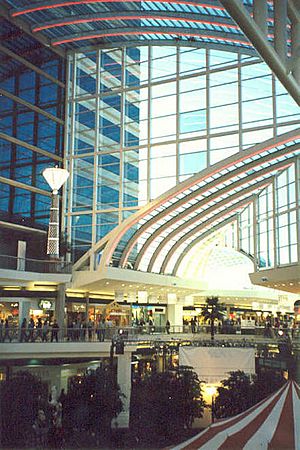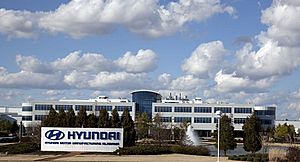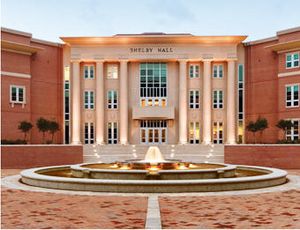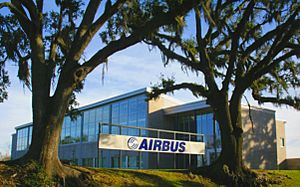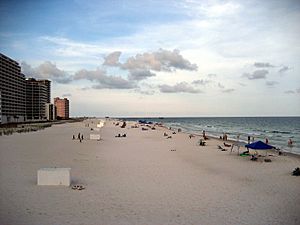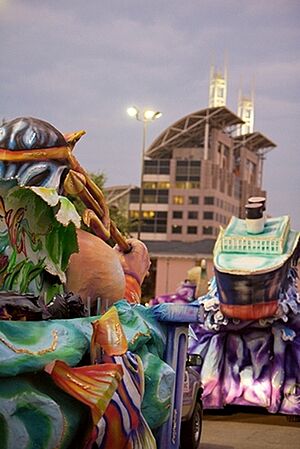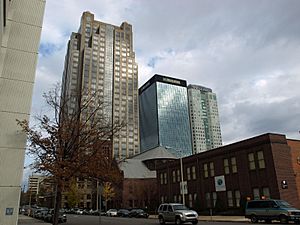Economy of Alabama facts for kids
Alabama has a strong and varied economy. It includes important areas like aerospace, education, healthcare, and banking. The state also has many heavy industries. These include making cars, mining for minerals, and producing steel.
In 2006, farming and animal raising in Alabama were worth about $1.5 billion. This was only a small part of the state's total economic output. Over the years, the number of small farms has gone down. Land has been sold for building, timber, and large farms.
In 2008, many people worked in different jobs. For example, 121,800 people worked in management. About 71,750 worked in business and finance. Over 36,000 had jobs related to computers and math. There were also many jobs in healthcare, sales, and office support.
In 2008, Alabama's total economic output was $170 billion. This means about $29,411 for each person. By 2012, this amount grew by 1.2%. The biggest growth was in the information sector. In 2010, the average income per person was $22,984.
In April 2015, Alabama's unemployment rate was 5.8%. This was close to the national rate of 5.4%. Alabama does not have its own state minimum wage. It uses the federal minimum wage of $7.25 per hour. In 2016, a state law was passed. It stopped cities in Alabama from raising their local minimum wage.
As of 2018, Alabama had the sixth highest poverty rate in the U.S.
Contents
Top Employers in Alabama
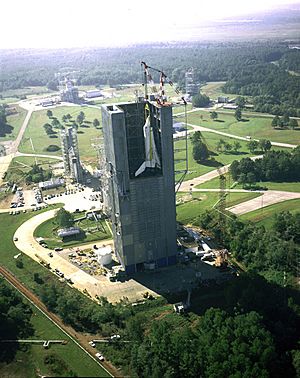
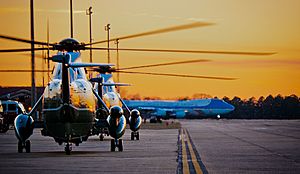
Many large organizations provide jobs in Alabama. Here are some of the biggest employers in April 2011:
| Employer | Number of Employees |
|---|---|
| Redstone Arsenal | 25,373 |
| University of Alabama at Birmingham (including UAB Hospital) | 18,750 |
| Maxwell Air Force Base | 12,280 |
| State of Alabama | 9,500 |
| Mobile County Public School System | 8,100 |
Other large employers in 2011 included:
| Employer | Main Location |
|---|---|
| Anniston Army Depot | Anniston |
| AT&T | Multiple cities |
| Auburn University | Auburn |
| Baptist Medical Center South | Montgomery |
| Birmingham City Schools | Birmingham |
| City of Birmingham | Birmingham |
| DCH Health System | Tuscaloosa |
| Huntsville City Schools | Huntsville |
| Huntsville Hospital System | Huntsville |
| Hyundai Motor Manufacturing Alabama | Montgomery |
| Infirmary Health System | Mobile |
| Jefferson County Board of Education | Birmingham |
| Marshall Space Flight Center | Huntsville |
| Mercedes-Benz U.S. International | Vance |
| Montgomery Public Schools | Montgomery |
| Regions Financial Corporation | Multiple cities |
| Boeing | Multiple cities |
| University of Alabama | Tuscaloosa |
| University of South Alabama | Mobile |
| Walmart | Multiple cities |
Farming in Alabama
Alabama's farms produce many different things. These include chickens and eggs, cattle, and fish. They also grow plants for nurseries, peanuts, and cotton. Other crops are grains like corn and sorghum, vegetables, and soybeans. Peaches are also grown here.
Alabama is sometimes called "The Cotton State." However, it usually ranks between eighth and tenth in cotton production in the U.S. States like Texas, Georgia, and Mississippi grow more cotton.
Industries in Alabama
Alabama's factories make many products. These include iron and steel items, paper, and wood products. Mining, mostly for coal, is also important. The state produces plastic goods, cars, and trucks. Clothing is another product made here.
Alabama also makes aerospace and electronic products. Much of this work happens in the Huntsville area. This is where NASA's George C. Marshall Space Flight Center is located. The United States Army Materiel Command is also headquartered at Redstone Arsenal.
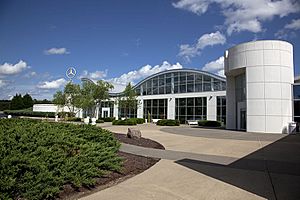
Since the 1990s, Alabama's economy has grown a lot because of car manufacturing. Companies like Honda Manufacturing of Alabama, Hyundai Motor Manufacturing Alabama, Mercedes-Benz U.S. International, and Toyota Motor Manufacturing Alabama have factories here. Many other companies that supply parts to these carmakers are also in the state.
Since 1993, the car industry has created over 67,800 new jobs in Alabama. The state is now 4th in the nation for exporting vehicles. In 2012, carmakers were responsible for about one-third of the state's industrial growth.
Steel companies like Outokumpu, Nucor, SSAB, ThyssenKrupp, and U.S. Steel have plants in Alabama. They employ over 10,000 people. In 2007, ThyssenKrupp chose Calvert in Mobile County for a large steel processing plant. Parts of this plant were later sold to other companies like Outokumpu, ArcelorMittal, and Nippon Steel.
The Hunt Refining Company is based in Tuscaloosa. It operates an oil refinery there. JVC America, Inc. also has a plant in Tuscaloosa that makes and packages optical discs. The Goodyear Tire and Rubber Company has a large tire factory in Gadsden. It has been making tires since 1929 and employs about 1,400 people.
In 2012, Airbus announced plans to build an aircraft assembly plant in Mobile. This $600 million factory at the Brookley Aeroplex would assemble A319, A320, and A321 aircraft. Construction started in 2013. The plant began operating in 2015 and aims to produce up to 50 planes per year. This was Airbus's first factory in the United States. In 2020, Airbus opened a second assembly line at the Mobile facility.
Tourism and Fun in Alabama
Tourism is a very important industry in Alabama. In 2014, Alabama was ranked the 14th most popular state to visit. In 2018, about 26 million tourists came to the state. Over 100,000 of these visitors were from other countries.
In 2006, visitors spent $8.3 billion in Alabama. This supported about 162,000 jobs. The state has many fun places to visit. These include beautiful natural spots, parks, and special events.
Some popular attractions are:
- The annual Hangout Music Festival in Gulf Shores.
- The Alabama Shakespeare Festival, one of the largest in the world.
- The Robert Trent Jones Golf Trail, with many great golf courses.
- Shopping centers like the Riverchase Galleria.
- Guntersville Lake, which was voted the best lake in Alabama.
- The Alabama Museum of Natural History, the state's oldest museum.
Mobile is famous for having the oldest organized Mardi Gras celebration in the United States. It started in 1703. The first official Mardi Gras parade in the U.S. was also held in Mobile in 1830. This tradition continues today. Mardi Gras is an official holiday in Mobile and Baldwin counties.
In 2018, Mobile's Mardi Gras parade was the top event for tourists. It attracted almost 900,000 visitors. The U.S. Space & Rocket Center in Huntsville was the most visited attraction. It had nearly 850,000 visitors. The Birmingham Zoo had over 543,000 visitors. Alabama's Gulf Coast beaches were the most popular natural destination, with 6.7 million visitors.
Alabama has also been a popular place for filming movies. This is because it has many different landscapes. Movies filmed in Alabama include Close Encounters of the Third Kind, Get Out, 42, Selma, and Big Fish.
Healthcare in Alabama
UAB Hospital is the only Level I trauma center in Alabama. This means it can handle the most serious injuries. UAB is also the largest state government employer in Alabama. It has about 18,000 workers.
Banking in Alabama
Regions Financial Corporation is the largest bank based in or working in Alabama. Other big banks like PNC Financial Services and Wells Fargo also have a large presence in the state.
Wells Fargo has a regional office and a large data center in Birmingham. Many smaller banks are also based in the Birmingham area. Birmingham is also home to several large investment companies.
Electronics and Communication
The telecommunications company AT&T, which used to be BellSouth, has many offices in Birmingham. Many technology companies are based in Huntsville. These include ADTRAN, which works with network access, and Intergraph, a computer graphics company. Avocent, an IT infrastructure company, is also there.
Construction
Several large construction companies are based in Alabama. These include Brasfield & Gorrie, BE&K, Hoar Construction, and B.L. Harbert International. These companies are often listed among the top design and construction firms.
 | William L. Dawson |
 | W. E. B. Du Bois |
 | Harry Belafonte |



